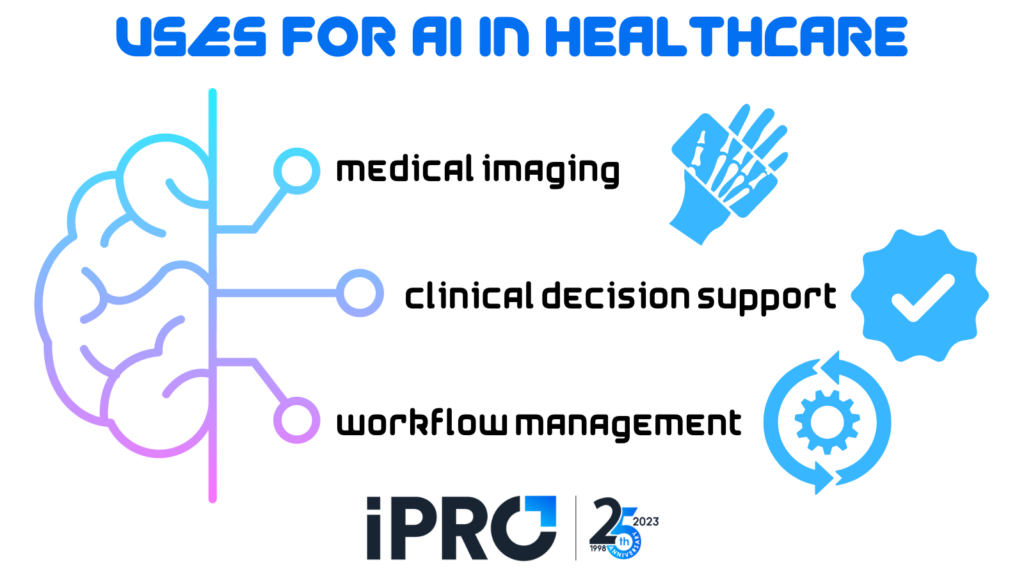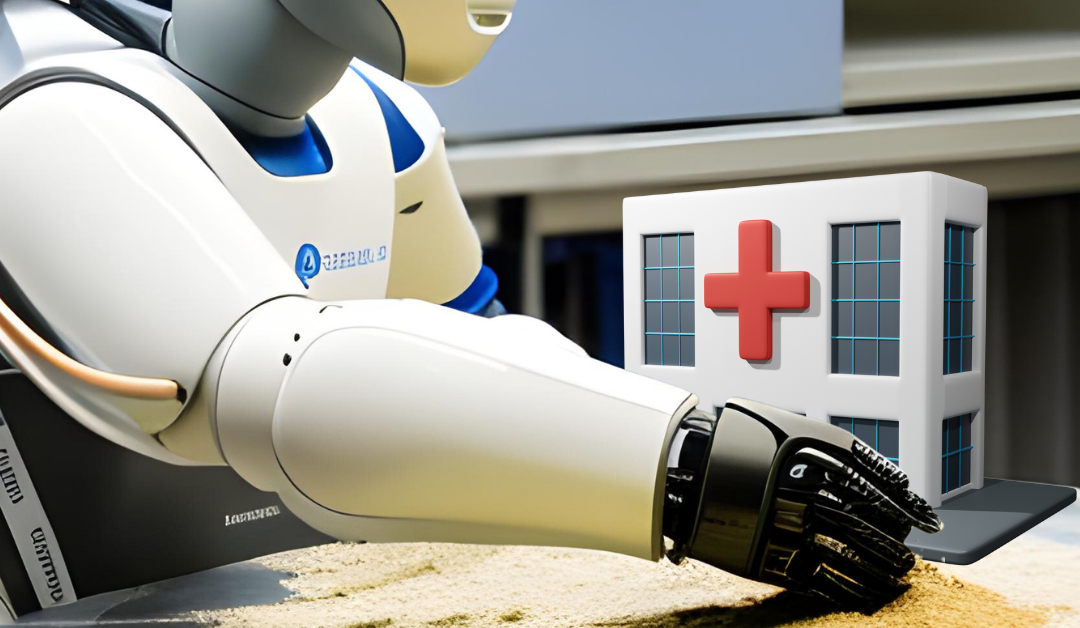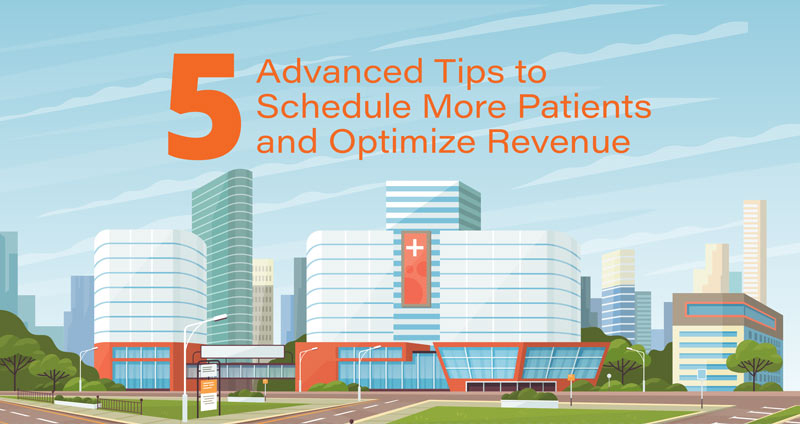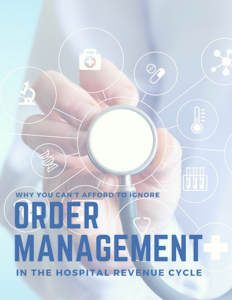From copywriting to image generation, AI has taken the world by storm as of late. With just a sentence or two of prompts, some AI applications can write an entire blog post, bring imagination to life in high quality images, or answer questions and make recommendations. In fact, the featured image in this article was partially generated by a text-to-image AI app. AI is reshaping many industries, but its potential uses in healthcare are of particular interest. With the right configuration and testing, AI can help improve healthcare for both patients and providers.
Artificial intelligence isn’t without its faults, however. To understand how AI can be effectively used in healthcare, we’ll look at some of its pros and cons. Then, we’ll dive into its potential uses in healthcare, including: imaging, clinical decision support, and workflows.
AI: The Good and The Bad
As with any emerging technology, AI comes with its pros and cons. On the one hand, AI can automate routine tasks, greatly reducing workloads. It also has the potential to detect illness before symptoms present. As we’ll discuss in later sections, AI can also aid in detecting cancer as well as recommending appropriate medical exams.
A major concern with AI in healthcare is the potential for inherent biases built in. For example, if the data AI is trained on is biased, such as medical data collected primarily from white patients, the AI may perpetuate these biases in its recommendations or processes. In these cases, non-white patients may not receive the care they need due to biased data that didn’t include the experiences of non-white patients.
Another concern, particularly with generative AI like ChatGPT, is that AI sometimes fabricates information. When AI is being used to recommend treatment or make a diagnosis, it should be reviewed by a physician before being implemented.

AI in Medical Imaging
Medical imaging is one area in healthcare that can benefit greatly from AI. Becker’s Healthcare recently asked 30 healthcare leaders what was the most effective use of AI in healthcare. Many felt that AI had effective uses in medical imaging, including:
- Anomaly detection
- Workflow reduction
- Image analysis
- Clinical decision support
- Voice transcription
The effective use of AI in medical imaging can lead to better outcomes for patients, particularly in regards to detecting cancer. For instance, Novarad, a medical imaging solutions provider, has partnered with CureMetrix, Ikonopedia, and Transpara to incorporate AI in their mammography solution, NovaMG Pro. NovaMG Pro’s AI applications analyze breast images and help radiologists evaluate images more quickly and effectively. NovaMG Pro also uses AI to prioritize cases and alert workflow protocols throughout the facility. This leads to improved clinical outcomes, reduced healthcare costs and increased assurance that patients are getting the highest standard of care available from screening through post-biopsy follow-up.
Clinical Decision Support and Ensuring Accuracy
Another major use for AI in healthcare is clinical decision support. A clinical decision support mechanism (qCDSM) uses AI to make treatment recommendations. This helps physicians and radiologists determine the correct exam or follow-up treatment for patients, or reinforce their own recommendation. AI-based clinical decision support also helps providers remain compliant with government policies and reduce claim denials.
Perhaps the greatest benefit of AI-based clinical decision support is improved patient safety and an overall better patient experience. Clinical decision support mechanisms’ ability to use AI to analyze heaps of patient data and recommend appropriate, evidence-based treatment leads to more streamlined care. It also helps reduce unnecessary procedures, saving patients time and money, and potentially reducing their exposure to radiation.
Our ambulatory order management software, iOrder, offers an integrated qCDSM to ensure outpatient orders meet medical necessity criteria. To further ensure order accuracy, iOrder asks a series of validation questions and alerts referring physicians of ICD-10/CPT code mismatches or other issues that could result in care delays or denials, such as a patient exceeding the weight limit of an MRI table. This all leads to improved patient safety, as well as increased revenue due to fewer claim denials.
Workflow Management
Another way AI is reshaping healthcare is in the form of workflow management. With burnout continuing to plague healthcare, streamlining workflows and reducing workloads is crucial. This is one area in which AI can help in numerous ways. Let’s look at a few ways AI can impact workflow management.
ChatGPT and Generative AI
Generative AI like ChatGPT can help gather patient information, scan EHR’s to develop care plans, answer questions, and draft patient messages. This helps eliminate these time-consuming tasks typically carried out by nurses and physicians according to healthcare leaders interviewed in a recent Becker’s Healthcare article.
“[AI] can help automate questions and answers, decrease time spent in chart reviews and documentation, and improve the quality of patient care. Prompting by these systems will also help nurses identify safety risks sooner, identify missed opportunities for assessment, and assist in identifying when follow-up is recommended.”
John Fairbaugh, MSN, RN, chief clinical information officer at Pittsburgh-based UPMC
Speech Recognition
Speech recognition software like 3M’s M*Modal Fluency for Imaging (FFI) solution uses AI to streamline workflows in several ways. First, M*Modal’s speech recognition capabilities allow radiologists to use their voice to search and create reports, reducing the number of clicks they have to make. AI also automatically detects actionable findings and alerts referring physicians. M*Modal also uses a combination of AI and Natural Language Understanding (NLU) to improve clinical report quality and patient care, reduce gaps in specificity, and increase referring physician satisfaction.
Innovating for Better Healthcare
Just like other industries, AI is reshaping healthcare in numerous ways. While there are still concerns and kinks to workout, the innovative capabilities of AI offer a brighter future for both patients and providers. At iPro, we’re proud to be a part of this healthcare innovation with our suite of healthcare solutions, many of which incorporate AI. Our solutions include:
- Medical imaging and reporting solutions for radiology, cardiology, and mammography
- Ambulatory order management including order validation, clinical decision support, and prior authorization services
- Speech recognition and transcription
Our ambulatory order management solution, iOrder, won the 2021 Gold Stevie Award for New Healthcare Technology Solution for its ability to transform the outpatient ordering process. iOrder reduces workloads, streamlines workflows, ensures order accuracy, and minimizes claim denials through a combination of order validation questions, an integrated qCDSM, patient engagement tools, and optional prior authorization assurance services.
“iOrder provides a structured, efficient process when lives and health of individuals require it. Streamlining communications and ensuring doctors’ orders are delivered accurately cannot be undervalued. iPro’s focus on such a regulated environment talks to the value of the effort and their confidence in addressing the problem set.”
-Stevie Awards Judge
Our Novarad South division offers innovative imaging solutions for radiology, cardiology, and mammography, including NovaMG Pro – a complete mammography solution that uses AI to detect anomalies and streamline reporting. We are also a licensed reseller of 3M’s M*Modal speech recognition solution that uses AI to reduce clicks and streamline reporting, resulting in higher efficiency and reduced burnout.
If you’d like to learn more about any of these innovative solutions, contact us today.




